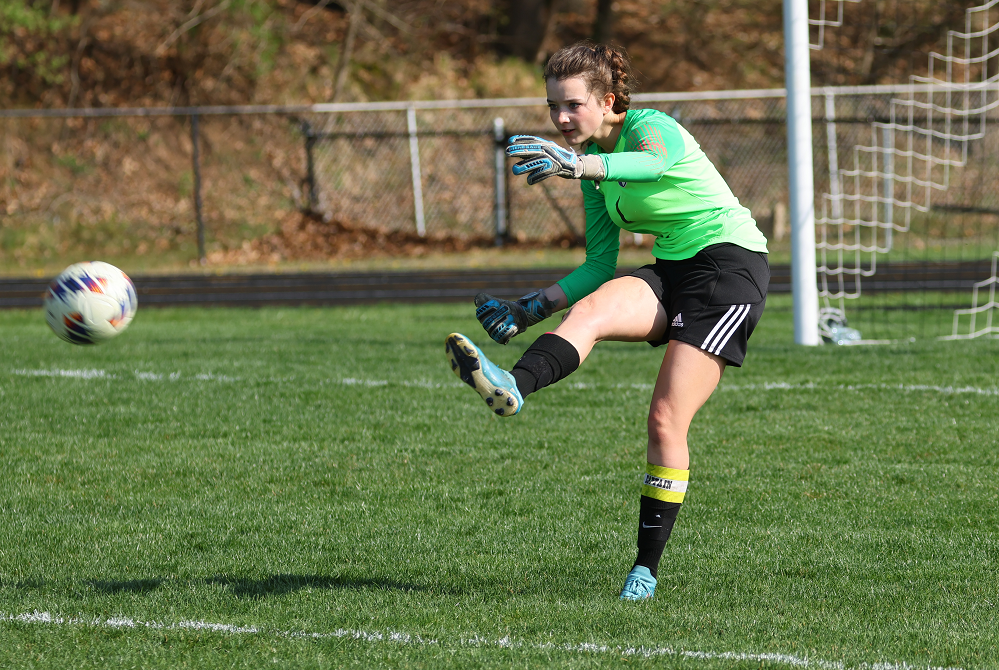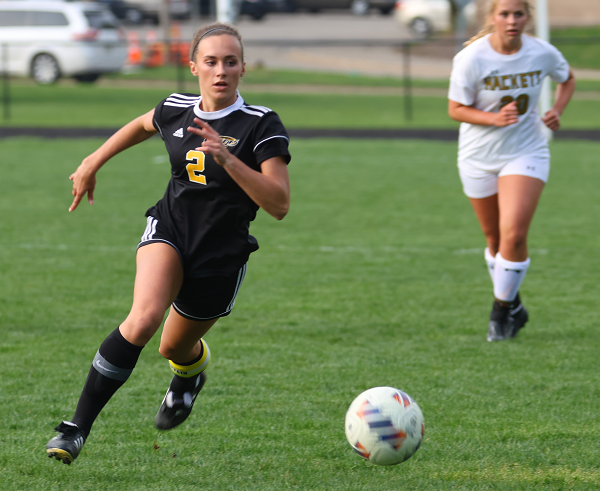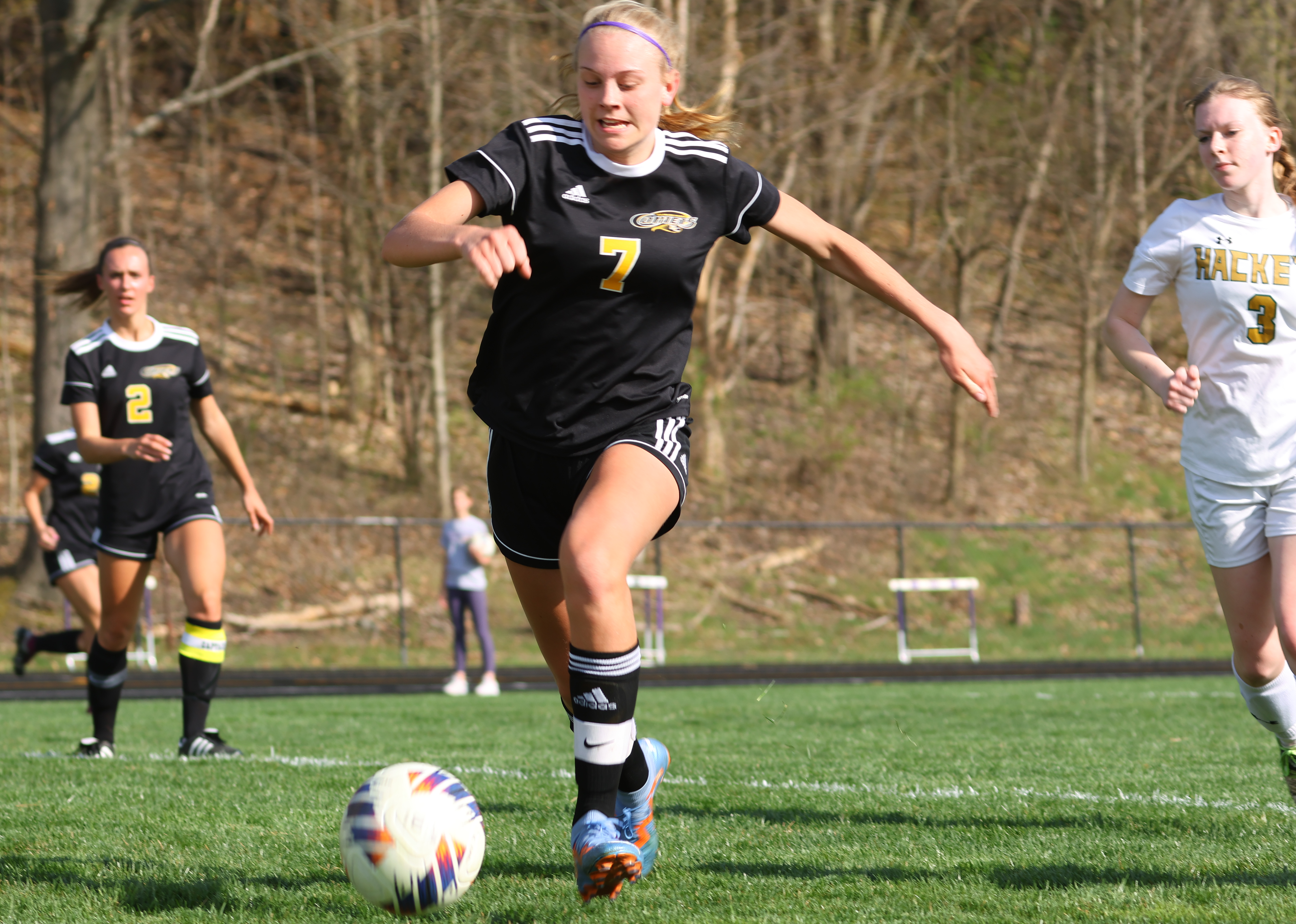
Kalamazoo Christian Building on Lessons Learned during 2022 Finals Run
By
Pam Shebest
Special for MHSAA.com
May 16, 2023
KALAMAZOO — During her freshman year, Elizabeth Netz was settling in on the Kalamazoo Christian junior varsity soccer team as a defender, gelling with her teammates with thoughts of one day playing on varsity.
 Those days came sooner than the now-junior expected.
Those days came sooner than the now-junior expected.
“When she was a freshman, we had no goalkeeper,” varsity head coach Jay Allen said. “JV had no goalkeeper either and would rotate kids in goal. One day I watched her in net and asked her if she would like to be the varsity goalkeeper.
“Elizabeth is very quiet and she probably, deep down inside, said ‘No.’ Since she didn’t outwardly say ‘No,’ I drafted her and she has been the varsity goalkeeper since her freshman year and has grown and kept us in games.”
Each game was a learning experience for Netz, who had no real experience in goal.
“I was very, very nervous,” she said of that first year. “I’m a very quiet, introverted person, but on the field I’m more confident to say ‘Hey, do this, do that’ and yell through the whole game.
“I definitely got better at yelling.”
After falling just short in the Division 4 championship game last season, a 1-0 heartbreaker to Royal Oak Shrine Catholic, Netz and her teammates are learning from that experience.
The Comets have allowed just 13 goals so far this year and take a 12-4 record into the final weeks of the regular season.
Senior Taylor Leonard, the team’s leading scorer with 25 goals, said a key is team cohesiveness.
“The team isn’t going to thrive off of one person,” she said. “Everybody has a super pivotal role, even if they don’t get in a lot, as long as they’re on the bench and encouraging.
“That’s huge for the overall success of the team.”
Allen said Leonard, who hopes to play soccer at Hope College, leads by example.
 “When there’s an issue on or off the field, you see her leading the way,” he said. “She’s a little reserved, but for those of us who know her, she’s a go-getter.”
“When there’s an issue on or off the field, you see her leading the way,” he said. “She’s a little reserved, but for those of us who know her, she’s a go-getter.”
Sophomore Jordyn Bonnema sets up many of Leonard’s goals.
“Jordyn’s talent is she can see things happening before they even happen,” Allen said.
“When the ball’s played to her, Jordyn’s already seen where that ball’s going to be three plays later. She may get rid of the ball, but three plays later the ball’s back at her feet.”
Bonnema has come a long way from the days when her parents signed her up for youth soccer.
“I think I was really bad when I was young,” she said. “My parents said I usually just stood and watched the ball.”
She has blossomed since then, not only becoming a force in soccer, but earning first-team all-state honors this year in both golf and basketball.
One thing she said the team learned from last season’s run to the Final is “the work you put in at the beginning of the season is really something that really pays off at the end.
“We all push each other and have the integrity to hold each other accountable – to be able to know we’re all working toward the same goal. At the end of the day, you’re working for the people that are next to you.”
Netz said that encouragement is a big motivator.
“Letting people know it’s ok to make mistakes. We just need to turn around and give everything into it,” she said. “We play for the glory of the team and for the glory of God.”
Tough competition always pays off
Allen always sets a competitive schedule to get the players prepared for postseason play.
“We play a tough out-of-conference schedule,” he said. “We take (a few lumps). We’ve played against some stronger Division 3 teams that, although the score doesn’t reflect it, we played really well.
“Having a very young back line and lineup, it shows our weaknesses, which then we can then tweak.”
 In spite of the “lumps,” Leonard said the team never gives up.
In spite of the “lumps,” Leonard said the team never gives up.
“In those games, we’re known to be relentless, even though we’re playing in these super competitive games with these strong teams,” she said.
“Everybody gives 110-percent effort. That also contributes at how well we do at the end of the season because we had to face many tough games throughout the season.”
The Comets have a three-pronged attack in Leonard, Bonnema and senior Chloe Lehman.
“When the three of them work together, it forces the rest of the team to fall into different spots,” Allen said. “We have some very good players like (senior) Annika Sytsma, (junior) Mackenzie Ling, (freshman) Izzy Suloff, (sophomore) Maysen Steensma, who all raise their level of play when the energy is high for the other three.
“This is truly a team. You can say Taylor, Jordyn and Chloe are the backbone, but the others are the muscle. They are what truly allows the other three to have the kind of success they have.”
Other seniors on the team are Maggie de Jong, Rylan Smith, Lillian Klooster and Halee Taylor.
Juniors are Sophia Nash, Phoebe Zeyl and Kate Watson.
The young team also includes sophomores Hannah Hoeksema, Annelise de Jong, Alaina Klooster, Rachel Miller and Kailey Triemstra plus freshmen Aubrie Lehman and Emilee Dyk.
Good fun, great lessons
All of Allen’s assistants are former K-Christian players and no doubt had a hand in some of the traditional pranks the girls play on him.
“It actually started with Jordyn’s mom (Candace Bonnema) when she Saran-wrapped my car and covered it in flour 28 years ago,” Allen laughed.
“She leads the school in yellow cards in a season with nine, and she started everything. Every year since, somebody has done something to me.”
 The coach takes it all in good fun.
The coach takes it all in good fun.
“Either they make a T-shirt of me with a funny face or they put raccoons in my car, and I’m deathly afraid of raccoons. I don’t know what they’re planning to do this year.”
Allen, who is a self-confessed Army brat, grew up in Madrid, Spain, and came to the United States when he was 18 to attend Western Michigan University.
He became an assistant to Comets coach Ron Smilanich 28 years ago, then took over the head coaching job 10 years ago.
He began coaching the boys team in 2010 and still keeps in touch with many former players.
“I average about three weddings and a baptism a year,” he said. “The impact I get to have on both the young ladies and men in this environment is fantastic.
Included in that group are current assistants Sarah Onderlinde, Emma Bertrand, Jenna Blackwell, Maegan Kilgus and Lauryn Mohney.
“One of the big things I like to do is teach them teamwork, teach them responsibility, being on time, working to those positions, how to deal with different personalities,” Allen said.
“One day, your boss is going to be ‘me,’ my generation, and you’re going to have to know how to deal with ‘me.’ How do you resolve a conflict on the team, how do you work together? We provide them with different tools.”
 Pam Shebest served as a sportswriter at the Kalamazoo Gazette from 1985-2009 after 11 years part-time with the Gazette while teaching French and English at White Pigeon High School. She can be reached at [email protected] with story ideas for Calhoun, Kalamazoo and Van Buren counties.
Pam Shebest served as a sportswriter at the Kalamazoo Gazette from 1985-2009 after 11 years part-time with the Gazette while teaching French and English at White Pigeon High School. She can be reached at [email protected] with story ideas for Calhoun, Kalamazoo and Van Buren counties.
PHOTOS (Top) Kalamazoo Christian keeper Elizabeth Netz puts the ball back in play during a game against Kalamazoo Hackett Catholic Prep. (2) Taylor Leonard leads the Comets’ charge upfield. (3) Kalamazoo Christian girls soccer coach Jay Allen. (4) Jordyn Bonnema (7) navigates among Hackett defenders. (Action photos by Dan Cooke; head shot by Pam Shebest.)

MHSA(Q&)A: Soccer Coaches President Zach Jonker
September 21, 2012
By Geoff Kimmerly
Second Half editor
Zach Jonker has had his hands – or, perhaps, feet – on just about every facet of soccer in this state over the last 20 years.
 He played on a Class B Semifinalist at Petoskey before graduating in 1995, then earned four letters and served as a captain at Hope College. He came back home to teach social studies and became coach of both boys and girls varsities that are regularly among the northern Lower Peninsula's elite, but also are highly-regarded statewide. And this fall, he began the first of a two-year term as president of the Michigan High School Soccer Coaches Association.
He played on a Class B Semifinalist at Petoskey before graduating in 1995, then earned four letters and served as a captain at Hope College. He came back home to teach social studies and became coach of both boys and girls varsities that are regularly among the northern Lower Peninsula's elite, but also are highly-regarded statewide. And this fall, he began the first of a two-year term as president of the Michigan High School Soccer Coaches Association.
So he can speak first-hand on the benefits of playing high school soccer in Michigan, which is good news to get out perhaps now more than ever. Michigan high school soccer is facing a predicament unlike any it has tackled before – the creation by U.S. Soccer of its Development Academy, a set of travel teams all over the country that train nearly year-round and are meant to eventually fuel the men's national team. That opportunity has drawn a number of top Michigan players out of high school soccer.
Jonker and his coaching brethren are monitoring that situation closely, while continuing to lead their teams into the second half of this fall boys season. His Northmen are 6-7-1 overall this fall, but have faced three of the top-five ranked teams in Division 1 and another from Division 2.
Despite your location near the tip of the Lower Peninsula, you still manage to schedule strong competition. How do you make it work?
We’re in a really nice spot. Traverse City hosts a tournament during the regular season with Traverse City Central, Traverse City West and Petoskey, and then they invite three schools from downstate that have generally been (Warren) DeLaSalle, Clarkston and Ann Arbor Skyline. The following weekend, we host a similar format with Rochester Hills Stoney Creek and Bloomfield Hills Lahser. We get six really good games at the start of the season with two tournaments. It’s early in the season and teams love coming up, making a weekend out of it, hitting the beach and doing some bonding. And the fields at Traverse City and Petoskey are both beautiful, which helps teams commit, plus the three of us are very competitive.
We’re coming down next weekend to play East Lansing, and we always schedule a couple of those. Last year, Mason came up here. It’s definitely a commitment in terms of travel during the course of the year, but from a Petoskey standpoint, I don’t care about our nonleague record. We’re using those games to get better for our league and better for the (MHSAA) tournament. The only tough thing is putting that in perspective for the kids.
What is something happening in high school soccer that the coaches association is proudest about right now?
We’re always looking at it from the other side, what we want to make better. But one of our main goals as an association is to properly recognize players. And I think the process we have in place for giving all-district, all-regional and all-state recognition and ultimately the selection of the Dream Team, I think that’s a very good model that enables us as an association to truly recognize players who put the work in and had a successful season. We also redesigned our web site this past season, and we’ve done a lot of the all-state process online, which a lot of coaches really liked because it cut down travel time for meetings.
Is anything new on the horizon?
A lot of coaches are really interested in seeing what the long-term impact of the (U.S.) Academy ruling is. Everyone’s initial take is we’re seeing increased parity round the state as the result of 120 kids electing not to play high school soccer this year. Obviously, all of those players are good players playing at a high level, and people are interested in seeing at the end of the season if kids are going to have missed playing in front of their communities, and if kids are going to migrate back to high school soccer. There’s talk of U.S. Soccer adding a U-14 academy. They’re trying to expand.
What has been the reaction so far to the U.S. Academy?
For certain players, the academy makes sense. They’re in a professional training environment 10 months out of the year. But those guys not on the professional track would be equally served by playing high school soccer and playing club like we always have. (U.S. Soccer) is doing a lot of this to benefit the top one percent of players. It’s the main frustration from the coaches.
Everyone kind of understands why U.S. Soccer is headed down that path, and it impacted each (high school) team differently. Some programs lost upwards of 8-10 kids as a result. Some didn’t lose any.
In terms of geographic parity, we’re already seeing that. Two years ago, west side teams won all four championships. Last year, Detroit teams won all four. Now we’re going to see more parity within districts, within conferences. And I think we’ll see scores closer than in the past.
What role should high school soccer play compared to club, the academy, etc.?
I equate it as playing for your national team. When you put your school colors on, go out with your friends that you’ve played with since kindergarten, it’s really special. They can’t even begin to match the rivalries we have with high school soccer, the amount of passion that exists within our game and the number of fans that show up at these games. At an academy game, you might have a handful of parents on the sideline, that’s it, and a few college coaches watching. But you can’t match the high school experience and the passion that exists. Kids are going to miss that, and we’ll get kids back because of that.
Do your players see an MHSAA championship differently because so many elite players aren’t participating in high school?
It doesn’t even register with these guys. The (MHSAA) championships are going to be awarded in November, and for whoever wins this year, it will be just as meaningful for these guys as the guys who won last year.
Does soccer get a bump from U.S. national team success like swimming or gymnastics might during Olympic years?
Any time it’s a World Cup year, men’s or women’s, the players get really excited about the experience. It gets them enthused to get out and train. I don’t think kids watch enough soccer in this country, and that’s one of the big issues we have. Ultimately, what’s holding us back at the national team level is kids are not growing up in a culture of soccer on television like in other countries against which we compete. In a World Cup year, kids get excited, and they watch more soccer, and the play is better on the field.
How much has high school soccer changed since you played?
There are just so many more layers of sophistication, tactically. We had good athletes playing at that point, and we have good athletes playing now. But as a country, we’ve evolved from a coaching standpoint. The kids are getting better technical training at a younger age, and are much better tactically. There are many more teams now emphasizing more possession-based (play). What else has helped the evolution is getting off playing on football fields. During the (19)80s and 90s, a lot of games were played on them, and it made it hard to possess the ball when the turf was chewed up. Soccer-specific fields have helped the game evolve.
What will Michigan high school soccer look like five years from now?
I like the path we’re headed down. The number one thing going forward is seeing what happens with the evolution of the academy program – do kids come back, or does the academy program grow? Regardless, the kids playing high school soccer are going to have a great experience, and there are a lot of really good coaches in high school soccer, a lot of really great referees and administrators. That makes the game special. I see us continuing to have the best going forward.

PHOTO: Petoskey senior Noah Honaker goes high while surrounded by defenders to head a ball during a game this season. (Photo courtesy of Dean Viles.)

